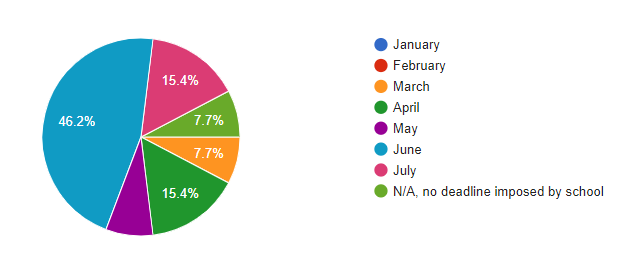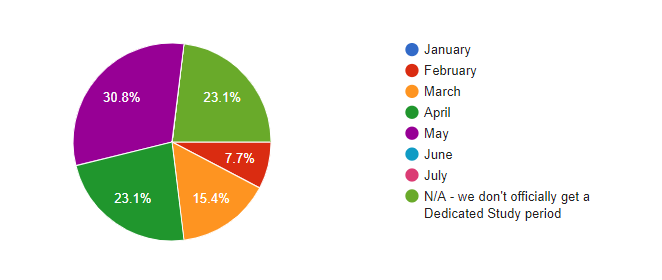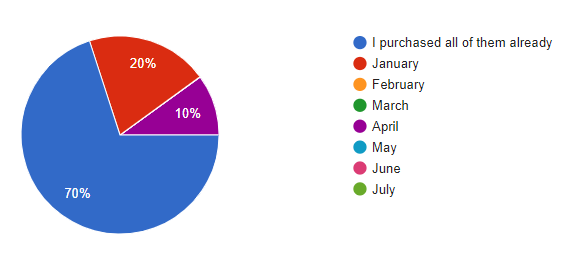Our Campus Heroes share advice for M2 students as they prepare to tackle their spring semesters.
With the new year under way, most second-year medical students are gearing up to take their USMLE Step 1 or COMLEX Level 1 board exams in the spring. At Cram Fighter, our stats show that the most popular months our customers take those second-year boards are June, May, and April, in that order. With the spring Boards timeline in mind, we surveyed our network of Campus Heroes in early January 2019 to get their advice for M2s to help them plan their semester most effectively.
When Are Students Required To Take Board Exams By?
Nearly half of our Campus Heroes stated that their med school requires them to take their Step 1 or Level 1 by June of their second year.

Dedicated Study
Most medical schools offer second-year med students a block of Dedicated Study, in which there are no classes. This gives students have a chunk of time to devote solely to studying for their board exams. Surprisingly, about 23% of our Campus Hero respondents said their school does not have Dedicated Study.

When Do Med Students Choose Their Study Resources?
70% of our medical student respondents stated that they had already purchased their study resources as of September 2018. Our students are planners, which is great! Successful last-minute studying is near-impossible when preparing for board exams.

How Should You Organize Your Spring Semester?
With so many students having already selected their resources, it’s no surprise that most of our students already have a plan of attack for studying during the spring semester. Many students organize their schedule into a period of “light” studying in which they review qbank questions, answer flash cards, and take a first pass through First Aid for the USMLE Step 1 . Typically, they spend a few hours a day on boards studying, while concurrently finishing up their M2 classes. Then, during Dedicated Study, they build a more hardcore study schedule of 6 to 10 hours/day focusing solely on their selected resources.
Here is some of the specific plans our students offered:
Before dedicated, I want to hit my resources as hard as I can and then use dedicated for repeating UWorld and to fine-tune weaknesses. I don’t want to be learning anything new during dedicated. The battle is won in the beginning. I do some practice questions everyday now, but will ramp up number during dedicated. Also I began to review micro now. I study everything before dedicated then will do final review and questions during dedicated. I am focusing on content review now followed by questions.
When Should Med Students Schedule Practice Tests?
We highly recommend using Practice Tests or Self-Assessments during your board exam study plan. Taking Practice Tests over the course of studying for your Step 1 and/or Level 1 exams is a great way to measure progress and identify weak areas. Practice tests also help build your confidence, as they are formatted the same way as the USMLE.
How you build Practice Tests into your study plan will be up to you, but our Campus Heroes had a range of strategies for using Practice Tests.
- I will begin taking practice tests in April when dedicated study begins. I plan to do one every 3-4 weeks. One more about a week and a half before the real deal.
- I have required NBME/COMSAE in April. My plan is to finish all my board studying by late April. I plan to use the UWSA and NBME weekly during my dedicated.
- I plan to take a practice test in early May as I hope to be done with qbanks by then.
- My planned practice tests are concentrated during my dedicated study time.
Closing Thoughts
In general, our Heroes’ advice echoed the general advice in the med student community on studying for Step 1. Plan, prepare, stick to your schedule, and definitely don’t procrastinate.
- Program everything into a schedule.
- Start before spring semester in planning and execute your schedule early to see if it’s even feasible. I’m a huge planner and had a schedule down by summer between M1 and M2 and I still feel like I fell behind. Actually, I know I’ve fallen behind because Cram Fighter told me so! Now I have to reevaluate and change my schedule, cutting some resources out. I used this winter break to execute/experiment with different schedules to see how much time I can allot to board studying while also making time for classes.
- Stick to a plan and stay consistent! You can do it!




